Cornish contractor diversifies with slurry bag hire service
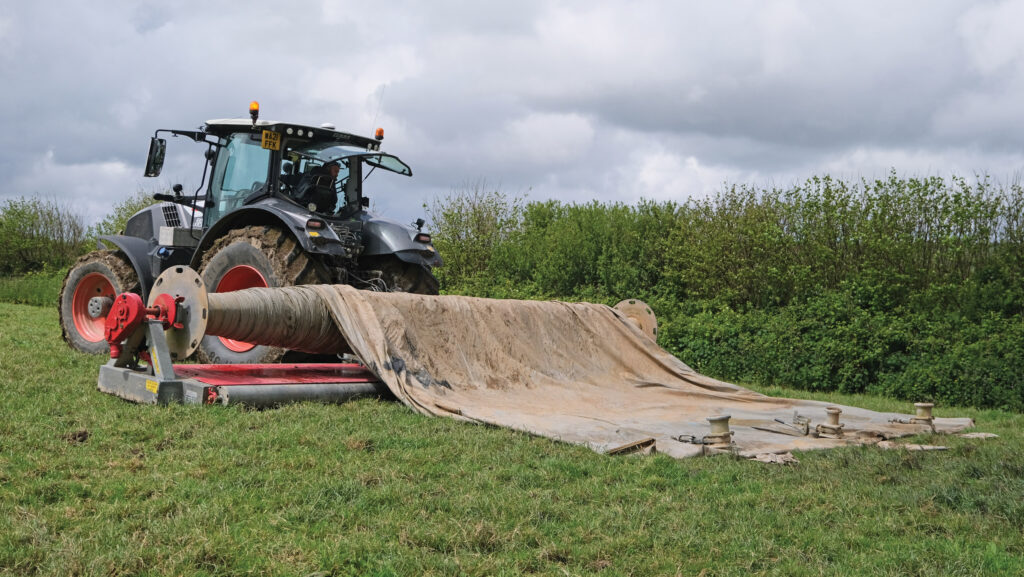 © James Andrews
© James Andrews Surrounded by dairy farms and an abundance of their main by-product, Cornwall-based contractors Josh and Helen Collins have recently branched out into slurry bag rental.
Each with a 350cu m capacity, the Albers Alligator Winbags they offer – sold by Tramspread in the UK – pack neatly onto a hydraulic reeler, ready to be deployed on any flat site.
See also: Borders contractor geared up to bag over 9,000t of forage/day
Typically, they are used as overflow stores and temporary vessels for when new lagoons are being built, but they also double up as large nurse tanks.
Filling and emptying can be carried out with a vacuum tanker or umbilical pump and, once finished with, they can be wound back onto their bobbin, loaded onto a trailer and taken to the next location.
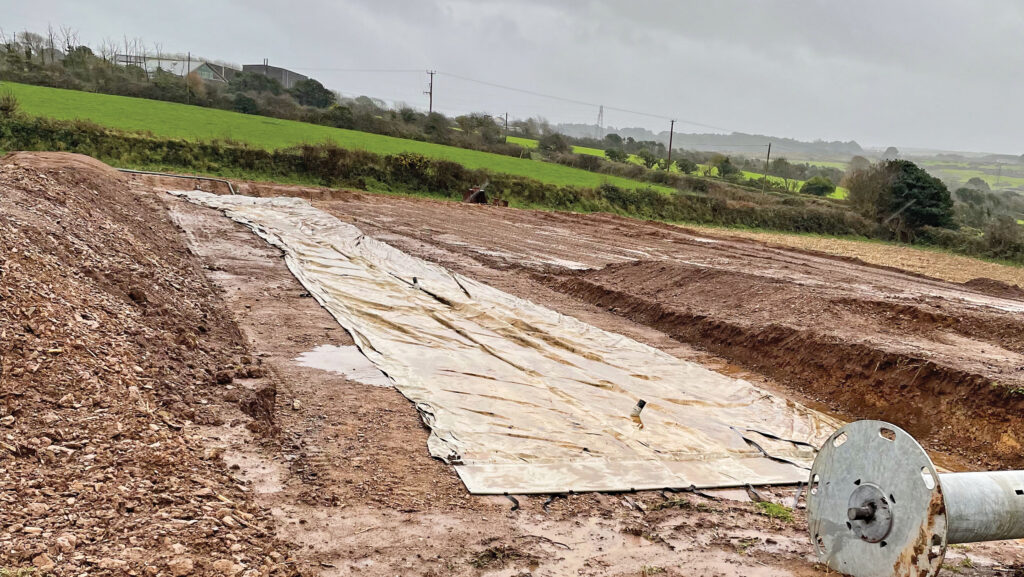
© James Andrews
Tough enough to drive on
To withstand this repeated handling, the bags are constructed out of a double-sided, coated polyester fabric, which is strong enough to be driven on by a tractor without bursting.
The only caveat being that there are no sharp stones underneath that could pierce them.
This toughness comes at a price – about £21,000 for each bag, plus £28,000-ish for a reeler – which makes them a little too steep for smaller farms to have in reserve should they need them.
But having a hire option on the table is a far more affordable proposition.
The Collins’ new venture came about after they went to empty some cheaper, thinner bags on a local farm, which didn’t go to plan.
“Some of these are sold to customers for temporary slurry storage, but they’re only really suitable for dirty water,” says Josh.
One of the problems is that slurry separates over time, with the solids dropping to the bottom and the liquid sitting on top.
There’s no way of shifting this sludge with cheaper thin-walled bags, as there’s rarely any means of stirring or agitating the contents.
They can’t be driven on to push it towards the outlets either, and they can’t be reeled up to help squeeze it out.
“In the end, we had to slice them open with a Stanley knife and dig out the solids with the loading shovel.”
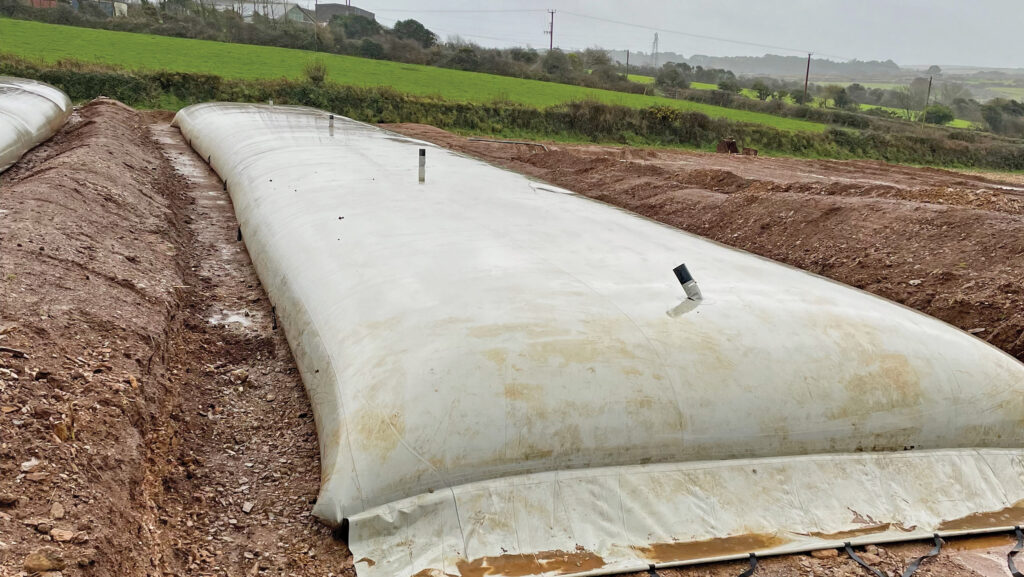
© James Andrews
Better quality bags
Tasked with finding a better option, Josh and Helen tracked down the Wingbag system and ended up buying a complete second-hand setup, including three 8x50m bags (smaller versions are available) and a hydraulic reeler.
These were soon booked up, so they added another three new bags to give additional capacity.
Most customers are in the South West, but they cover the south of England and have so far delivered bags as far away as Wiltshire.
Rental cost is roughly £500 a week, but minimum hire periods and haulage costs vary according to location.
All their customers need to take delivery of a bag is a flat 10x60m site without any sharp objects underneath.
If such an area isn’t available, Josh says a mildly sloping site can be levelled in about two hours by a good digger driver.
“We usually bank the soil up on the low side to remove any risk of it rolling down the hill,” he says.
Bare soil is a perfectly acceptable surface for a bag, providing there aren’t too many stones underneath. But if this is a problem, a lorryload of builder’s sand is recommended to reduce the risk of punctures.
Laying the bag
Bags are laid by winding them off a bobbin which loads into the hydraulic reeler.
This is generally mounted on a tractor’s rear linkage, but it also has slots for pallet tines, so it can be used with a large telehandler or loading shovel.
Some attention to detail is required, as the operator needs to make sure the bag is wound out flat, without any folds or overlaps.
“This means you have to keep some tension in the bag by driving along as you unwind it,” says Josh.
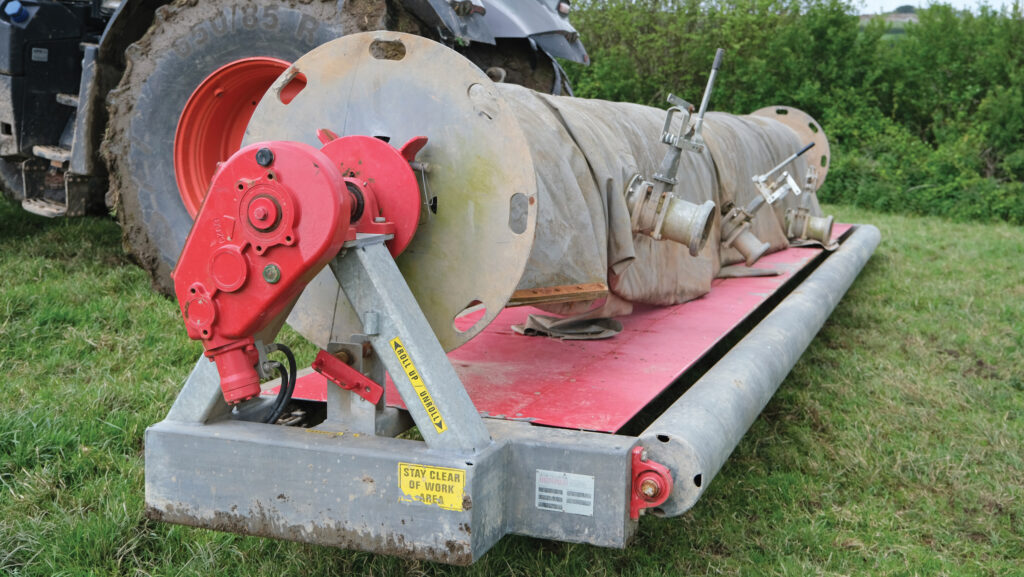
© James Andrews
Filling and emptying
Each bag has two 15cm and one 10cm port on the end for filling and emptying.
There are also four top vents that allow air to pass out of the bag as the slurry flows in, as well as releasing gasses produced during storage.
Just one port is required when filling, but the others give useful agitation options during emptying.
When drawing out with an umbilical pump, they attach the return line to the 10cm port and run the pump to help circulate and mix the contents.
If there’s any thick sludge left at the end of the job, they have the option of adding water from a tanker via the third port to help loosen it up.
“As the bags are so tough, we can also start reeling them up as we’re emptying, squeezing the slurry out like you would toothpaste from a tube,” says Josh.
Nurse tank
The bags can be moved easily, so Josh and Helen also occasionally use them as large nurse tanks for umbilical spreading.
They work particularly well when there’s a large block of land away from the main store, says Josh.
“We can fill the bag in advance and have 350cu m ready to go, so the tractor on the dribble bar isn’t waiting around for tankers to arrive.”
That said, most of the land where they need to use a nurse tank is in small blocks, so more often they use their own 30cu m trailed unit.
This is made out of an old RMH twin tub mixer wagon with the rotors removed and two outlets fitted into the recesses where the driveshafts once sat.
Another up-and-over pipe is used for filling and they added cross braces to help support the sides.
Punctures
Despite the tough construction of the bags, they can get punctured when abused.
This most commonly occurs when customers drive on them and there are sharp objects underneath.
Thankfully, they are easy to repair with plastic heat-welded patches that can be applied when the bags are still full.
“There’s very little pressure in the bags, so you can stuff a bit of rag in the hole to slow the flow and then weld a patch on the outside,” says Josh.
“We haven’t had any leaks after a repair, but sometimes we’ll double up with a larger patch over the top of the first, just to make sure.”
They had plenty of practice at these repairs when their second-hand bags arrived.
The previous owners had used them for storing whey, and rats had been gnawing away to get at the contents, leaving them peppered with small holes.
Hours of work lay ahead finding the leaks and patching them. But they made the job considerably faster by blocking off the vents and inflating each bag with the compressor to quickly locate the holes.
Rising demand for the hire service means additional bags could be added to the fleet this winter.
JJ & HE Collins
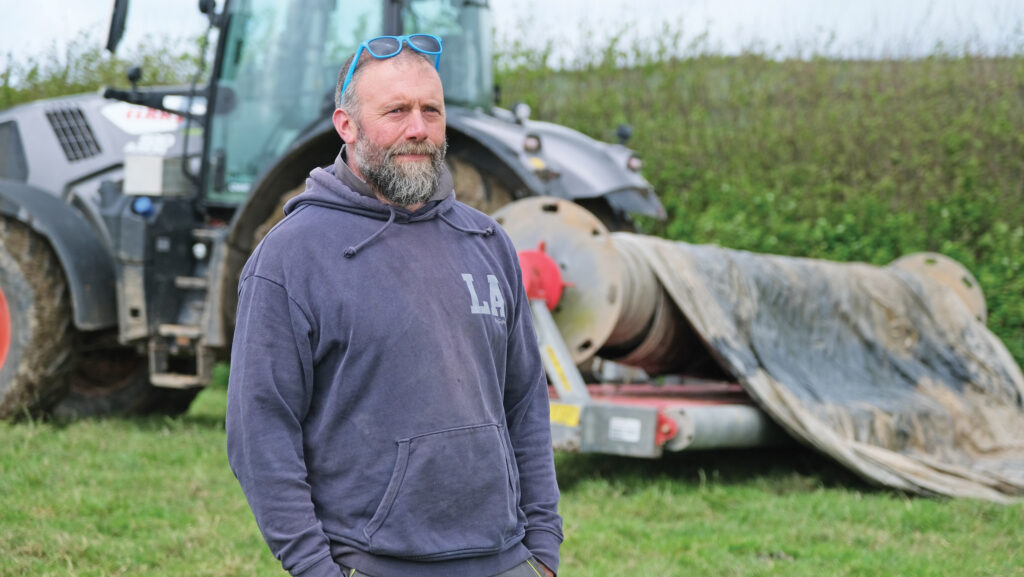
Josh Collins © James Andrews
Josh and Helen Collins run a mixed contracting operation from their base near Truro, Cornwall.
Services include cultivation work, drilling, combining and baling, in addition to running a full suite of grassland kit. Examples include a Kuhn merger and Claas Jaguar 950 self-propelled forager.
Muck and slurry are other fundamental arms of business, with a pair of side-discharge spreaders, tankers and an umbilical setup.
Semi permanent storage bag
For longer-term storage, Tramspread offers semi-permanent Albers Alligator slurry bags with capacities up to 7,000cu m.
These are made from reinforced UV-resistant polyester and feature filling/emptying ports, gas vents and a spill tank.
There is also a lockable inspection opening and the option of adding mixers to keep the contents agitated and prevent it separating out.

